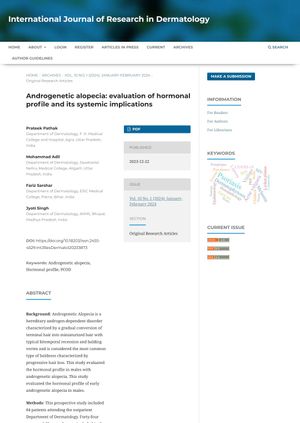Androgenetic Alopecia: Evaluation of Hormonal Profile and Its Systemic Implications
December 2023
in “
International Journal of Research in Dermatology
”

TLDR Hormonal imbalances are important in the development of male pattern baldness.
The study "Androgenetic alopecia: evaluation of hormonal profile and its systemic implications" involved 84 male participants, 44 of whom had grade ≥ 3 androgenetic alopecia, while the remaining 40 served as controls. The study found that the mean age of onset for androgenetic alopecia was 24.29±3.28 years, with a positive family history in 65.90% of patients. The hormonal profile of the patients showed that serum testosterone, prolactin, LH, LH/FSH, and FAI were increased, while serum FSH and SHBG were decreased in cases of androgenetic alopecia compared to controls. These results were statistically significant with p values <0.05. This suggests that hormonal imbalances may play a significant role in the development of androgenetic alopecia.

